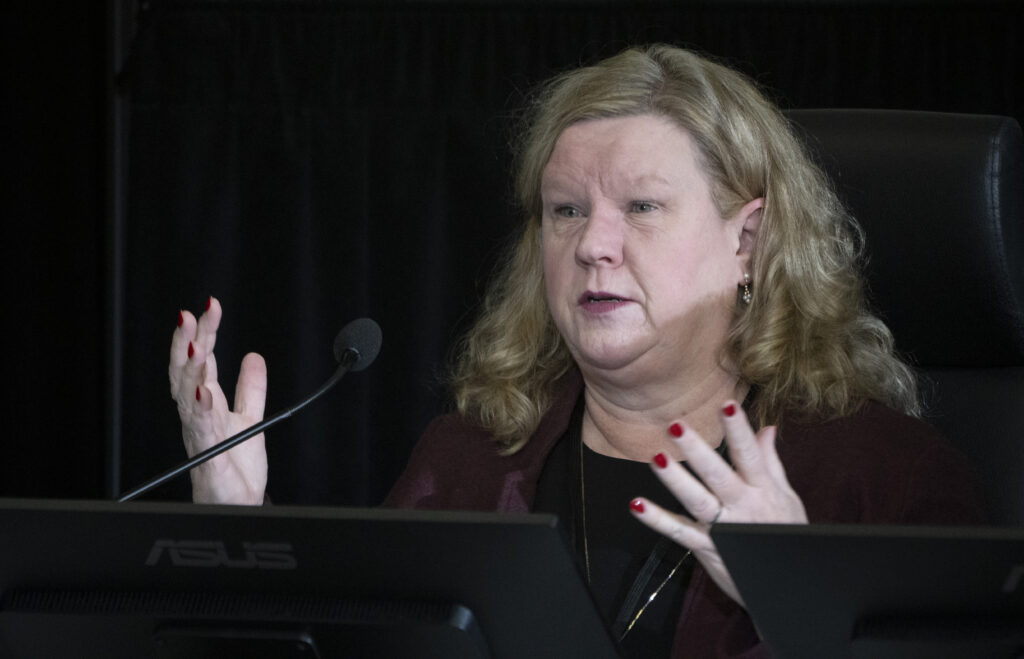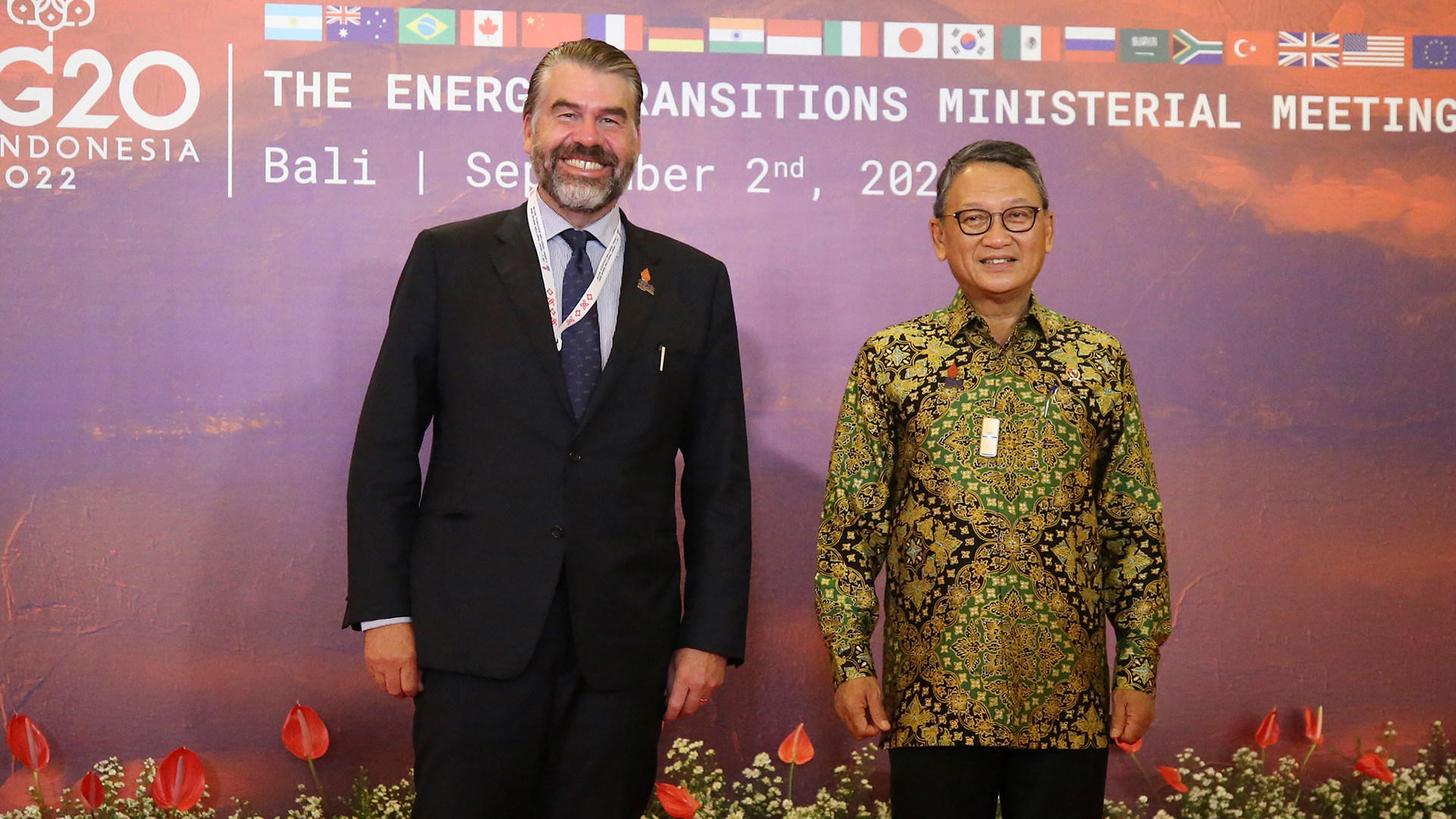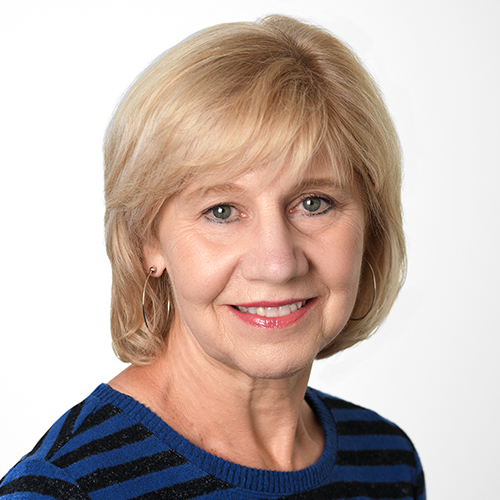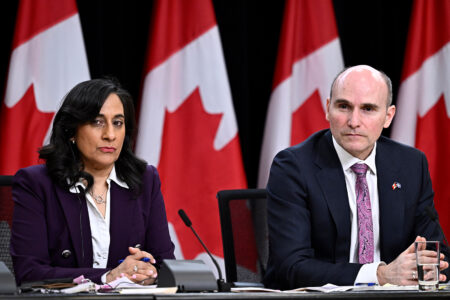
(Version française disponible ici)
Updated Thursday, June 1.
OTTAWA – Prime Minister Justin Trudeau has left many tongues wagging in the nation’s capital in picking a new top bureaucrat with a résumé out of step with that of previous public-service bosses but one that aligns with the thorny issues dogging the government in the run-up to the next election.
John Hannaford, the deputy minister at Natural Resources, has been named the next clerk of the Privy Council Office. The announcement came within an hour of Trudeau announcing that Janice Charette, the respected top-ranking public servant who led the bureaucracy through a once-in-a-century pandemic, is retiring June 24.
In some bureaucratic circles, Hannaford is a wild-card pick. His name wasn’t on the usual list of candidates bandied around as would-be contenders for the top job. He also doesn’t fit the mould of recent clerks, who typically have several deputy minister posts under their belts, including a large department with stints at the Privy Council Office (PCO), Finance or Treasury Board.
But Trudeau has picked a “known quantity and a familiar face,” someone he has worked with on the big issues he is facing now, says Donald Savoie, a leading academic on public administration. Hannaford knows trade, security, Canada-U.S. relations, energy and climate – and he’s a diplomat.
Wesley Wark, a national security and intelligence expert, said Hannaford is a logical and qualified choice and his immediate appointment suggests the selection was thought-out before special rapporteur David Johnston’s recent report on foreign interference highlighted the machinery of government problems in managing security and intelligence issues.
“What I would say is the times are changing and the qualifications for clerk are shifting. The expertise base is different. You can’t be a clerk now if you don’t have substantial experience in the defence, security and foreign policy world.”
Hannaford worked closely with Trudeau as his former foreign and defence policy advisor during the government’s early days. He then moved to international trade as deputy minister, where he worked with now Finance Minister Chrystia Freeland. He had a hand in negotiating the Trans-Pacific Partnership and the Canada-United States-Mexico Agreement (CUSMA). He knows the security and intelligence files from his years at Foreign Affairs and his earlier perch as foreign and defence policy advisor at PCO and climate change and the energy transition from his current job at Natural Resources.
“He has such an interesting toolbox of expertise,” said one senior bureaucrat who is not authorized to speak publicly. “Like a Renaissance man. He’s not just economic policy, social policy or trade and not only a diplomat. He really covers a very wide waterfront.”
[wd_hustle id=”20″ type=”embedded”/]
Hannaford is a lawyer who came up through Foreign Affairs, and colleagues say his stint as a diplomat, including as Canada’s ambassador to Norway between 2009 and 2012, serves him well. He’s “unflappably calm like you expect from a diplomat,” said one former colleague.
Those who have worked with him call him whip smart, someone who brings insight and experience to concerns of foreign election interference at a time when Johnston has called out security agencies for failing to communicate threats to political and bureaucratic leaders.
“He is super smart. Well-versed and well-equipped,” said one long-time observer. “If you’re looking for somebody who has specific expertise in intelligence and foreign security like this, this is definitely a guy.”
Hannaford will move to PCO right away, on June 1, to plan for the transition before taking over as clerk on June 24.
“Mr. Hannaford brings a wealth of experience and a strong reputation to this important role,” Trudeau said in a statement. “I am confident that his longstanding commitment to serving Canadians will allow him to lead our world-class public service as it continues to implement the Government of Canada’s agenda and make life better for people across the country.”
The Trudeau government and the Privy Council Office, the bureaucratic nerve centre, have faced a steady drip of bad news since the pandemic – allegations of Chinese election meddling and foreign interference, the biggest public service strike in recent history, inflation and rising prices. Conservative Leader Pierre Poilievre has jumped on it all, arguing that government is broken.
The clerk wears many hats – secretary to cabinet, deputy minister to the prime minister and head of the public service.
One senior bureaucrat called it “refreshing to have a clerk from outside the box.” Others worry a new top bureaucrat with a strong leaning to international affairs will come at the expense of the big issues facing the public service – a looming cut in operating budgets, aftermath of the strike, the arrival of AI and ChatGPT, and the growing pile of management reforms that experts are increasingly calling for.
Hannaford’s unexpected appointment has overshadowed the departure of the widely respected Charette.

Charette has had the unusual distinction of serving as clerk twice. She was picked as clerk in 2014 by former prime minister Stephen Harper. She remained in the job under Trudeau until 2016, when he named her High Commissioner for Canada in the United Kingdom. Trudeau then brought her back as interim clerk in 2021 and reinstated her as clerk a year ago in a permanent position.
The job of clerk is punishing, the hours long and the typical shelf life is three to five years. There has been much chatter about how long Charette, eligible to retire, would remain in the job. Many argued she would have had to leave by Christmas to give the government time to transition to a new clerk who would be there for the next election and possibly manage transition for a new government. The clerk also sits on the panel of senior public servants tasked with determining whether incidents of interference could threaten a free and fair election.
Trudeau singled out her advice and leadership during the pandemic and is making her a member of the King’s Privy Council for what he has said is her exceptional contribution.
“Janice Charette has had an outstanding career as a public servant, which has earned her great respect and recognition both nationally and internationally,” Trudeau said in a statement.
Charette managed two transitions and stick-handled the pandemic, a new Governor General, resettlement of Afghanistan refugees, the truckers’ protest, a war in Ukraine, rising inflation, allegations of Chinese interference, and a historic public-service strike to name a few challenges.
She led the public service through unprecedented times, chiefly the pandemic, which upended how people work and how the public service operates in ways never imagined. She led the move to hybrid work; was the first clerk in the Commonwealth to make mental health in the workplace a management priority, and more recently issued a strong directive to deputies to step up efforts to tackle racism, promote reconciliation, equity and inclusion in Canada’s public service.
“She was a good clerk,” said Savoie. “In fact, she is one of the better clerks we have had. She served with loyalty and competence, and to survive as long as she did with no major faux pas speaks to her competence. She leaves with her head high, and so she should.”
Public service finally has a new boss, and she’s the old boss
Sweeping deputy minister shuffle raises the question, “what took so long?”
The other big job everyone is watching is at Finance, the most powerful department. Michael Sabia, the deputy minister and top bureaucrat at Finance Canada, is leaving June 2 and will become the CEO at Hydro-Québec. The associate deputy minister Nick Leswick is filling in.
It’s an unusual opportunity to shuffle the bureaucracy from the top down as the government fills the two top jobs. The government was clearly planning for these moves at the top and quickly shifted seven other senior bureaucrats into new jobs with several aimed at shoring up the way intelligence is managed and communicated.
Sabia was in the job for three budgets and worked closely with Freeland. His departure leaves a big hole that, with a new clerk at the helm, could a trigger a further shuffle of top executives.
Jody Thomas, the prime minister’s national security and intelligence advisor got her first deputy, Daniel Rogers, who was a former associate chief of the Communications Security Establishment.* Rogers moves to this new post from his job as PCO’s deputy secretary of emergency preparedness and COVID recovery. Stephen de Boer, the assistant deputy minister of international affairs at Environment and Climate Change Canada, becomes the prime minister’s new foreign and defence policy advisor.
Hannaford’s job at Natural Resources also has to be filled. Until then, Mollie Johnson, the department’s associate deputy minister is filling in.
A deputy minister shakeup could fit with the speculation that the government may be gearing up for a major reset this summer, perhaps with the prorogation of Parliament, a cabinet shuffle, and a new speech from the throne in the fall.
This article was produced with support from the Accenture Fellowship on the Future of the Public Service. Read more of Kathryn’s work here. She also covers the ins and outs of the public service through her newsletter The Functionary.
Note to readers: Daniel Rogers’s title has been corrected.











